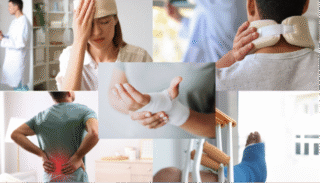
Your Health Magazine
4201 Northview Drive
Suite #102
Bowie, MD 20716
301-805-6805

More Legal and Health Articles
What are the Common Injuries a Rollover Accident Victim May Sustain?

A rollover accident happens when a vehicle tips over onto its side or roof. These crashes are among the most dangerous on the road. They often cause severe, life-changing injuries and, in some cases, death.
Charleston, West Virginia, as the state’s capital and largest city, lies at the convergence of the Elk and Kanawha Rivers and remains a vital regional hub for government, commerce, healthcare, and education. Its network of highways, riverside roads, and urban-rural traffic patterns underscores the importance of navigating Charleston’s roads safely.
A skilled Charleston, WV Rollover Accident Attorney can help victims understand their rights, especially in cases where another driver’s negligence or a vehicle defect played a role.
What Are the Most Common Injuries in Rollover Accidents?
1. Head and Brain Injuries
Head trauma is one of the most common and serious injuries in rollover crashes. Victims may suffer concussions, skull fractures, or traumatic brain injuries (TBI). Even a mild head injury can cause headaches, confusion, and memory problems. Severe TBIs may lead to permanent cognitive or emotional changes.
2. Spinal Cord Injuries
The force of a rollover can damage the spinal cord. This may result in partial or complete paralysis, depending on the location and severity of the injury. Roof crush incidents or being ejected from the vehicle increase this risk. Spinal injuries often require lifelong care.
3. Broken Bones and Fractures
The twisting and crushing motion of a rollover can easily break bones. Common fractures involve arms, legs, ribs, and the pelvis. Some breaks heal with a cast, but others need surgery and months of rehabilitation. Broken ribs can also damage nearby organs.
4. Internal Injuries
Rollover accidents can cause internal bleeding or damage to organs like the lungs, liver, or spleen. These injuries are dangerous because they may not be obvious right away. Without quick treatment, internal injuries can be life-threatening.
5. Cuts and Lacerations
Flying glass and torn metal often cause deep cuts. While some lacerations heal quickly, others can leave lasting scars or lead to infections. Wearing seat belts and keeping windows closed can help reduce this risk, but cannot eliminate it entirely.
6. Soft Tissue Injuries
Sprains, strains, and whiplash are also common in rollovers. These injuries affect muscles, ligaments, and tendons. They may seem minor at first, but they can cause long-term pain or limited mobility if not treated properly.
Why Do These Injuries Happen in Rollover Crashes?
Rollover accidents involve multiple impact points and strong forces. A vehicle may flip several times before stopping. This motion throws occupants around inside the car, even if they wear seat belts. In some cases, people are ejected from the vehicle, which greatly increases injury severity. Vehicle design, load weight, and speed also play a role in how severe injuries can be.
How Can Victims Protect Their Rights After a Rollover Accident?
After a rollover crash, quick action can make a big difference.
1. Seek Medical Care Immediately – Some injuries are not visible but can still be dangerous.
2. Document the Scene – Take photos of the vehicle, road conditions, and visible injuries.
3. Collect Witness Statements – Get names and contact details of anyone who saw the crash.
4. Contact a Lawyer – An experienced attorney can guide you through the legal process, deal with insurance companies, and fight for fair compensation.
Rollover accidents can cause a wide range of injuries, many of them life-changing. Understanding these risks can help victims and their families recognize the seriousness of the situation and take steps to protect their health and well-being.
Other Articles You May Find of Interest...
- How a Personal Injury Accident Affects Your Life
- Why Documenting Property Damage Is Critical After a Charlotte Car Accident
- How Delaying Medical Care Can Impact Your Legal Case
- What Damages Can Be Claimed After a Medical Error?
- How Technology Helps a Modern Medical Malpractice Lawyer Win Cases
- How Brain Injury Can Affect Your Day-to-Day Life
- Understanding the Dangers of IVC Blood Clot Filters














